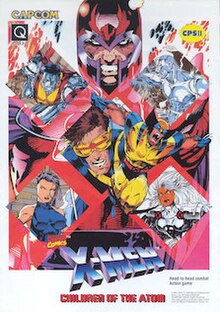| X-Men: Children of the Atom | |
|---|---|
 Arcade flyer | |
| Developer(s) | Capcom[a] |
| Publisher(s) | Capcom[b] |
| Director(s) | Akira Nishitani Noritaka Funamizu Kei Hiratou Kiyoshi Nishikawa T.H.T. Fuji Atsushi Tomita Amy Smith-Boylan (DOS) |
| Producer(s) | Tim Bradstock (DOS) |
| Platform(s) | Arcade, Sega Saturn, MS-DOS, PlayStation |
| Release | Arcade Sega Saturn PC PlayStation |
| Genre(s) | Fighting |
| Mode(s) | Up to 2 players simultaneously |
| Arcade system | CP System II |
X-Men: Children of the Atom (Japanese: エックス・メン チルドレン オブ ジ アトム, Hepburn: Ekkusu Men Chirudoren obu ji Atomu) is a 1994 fighting game developed and published by Capcom and released on the CP System II arcade hardware. It was released in December 1994 in Japan and in January 1995 in North America and Europe.
Based on the X-Men comic book, it is the first fighting game produced by Capcom using characters under license from Marvel Comics. Released around the time of the mid-1990s X-Men animated series, the game features voice actors from the series reprising their roles. The game's plot is based on the "Fatal Attractions" story from the comics – players control one of the X-Men or their enemies in their fight against the villain Magneto. They face each of the other characters in the game in best of three one-on-one fighting matches, before battling Juggernaut and Magneto.
The gameplay has much in common with Capcom's previous fighting games, Super Street Fighter II Turbo and Darkstalkers. Children of the Atom adds a combo system that features long combos that can even be performed in mid-air. Also featured in the game are various tactical maneuvers, including the ability for characters to roll. Children of the Atom introduced multi-tiered fighting environments in which the ground would crumble and characters would fall into lower parts of the level. These concepts and the fast pace of the game would provide the basis for Capcom's Marvel vs. Capcom series, which started with the game's successor X-Men vs. Street Fighter.
Ports of the game were released for Sega Saturn, PlayStation and MS-DOS. Of these, the PlayStation version was not as well received as the other versions, suffering from slowdown and missing frames of animation.
- ^ Webb, Marcus (March 1995). "Arcadia". Next Generation. No. 3. Imagine Media. p. 31.
- ^ "sega-saturn.com - news". Sega.com. Sega. Archived from the original on 6 June 1997. Retrieved 6 July 2023.
- ^ "X-Men: Children of the Atom Head-to-Head Combat Action Game!!". Maximum: The Video Game Magazine. No. 3. EMAP. January 1996. pp. 64–71.
- ^ Lomas, Ed (May 1996). "Checkpoint - The Month's Events and Software Releases". Computer and Video Games. No. 174. Future Publishing. p. 65.
- ^ "X-Men: Children of the Atom". GameSpot. Archived from the original on August 8, 1997. Retrieved November 18, 2024.
Released: 06/97
Cite error: There are <ref group=lower-alpha> tags or {{efn}} templates on this page, but the references will not show without a {{reflist|group=lower-alpha}} template or {{notelist}} template (see the help page).